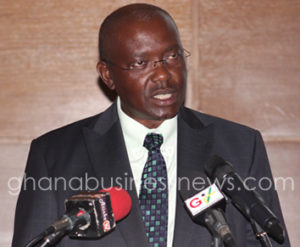World Bank to help Ghana simplify tax administration
 The World Bank says it will support to Ghana in efforts to strengthen the country’s macroeconomic stability and to simplify tax administration to boost domestic revenue through voluntary compliance.
The World Bank says it will support to Ghana in efforts to strengthen the country’s macroeconomic stability and to simplify tax administration to boost domestic revenue through voluntary compliance.
Speaking at the Germany-Ghana Investor Forum, organized under the G-20 Compact with Africa, the World Bank Country Director for Ghana, Henry Kerali, said the Bank will continue to support, in addition to strengthening macroeconomic stability, to help create the environment for private sector investment to spur growth and job creation.
This he said, the Bank plans to do by among other things, simplifying the tax administration to boost domestic revenue through voluntary compliance.
Aside simplifying the tax administration, Mr Kerali said that Bank will also support the implementation and maintenance of a Public Investment Management framework to ensure value-for-money in the creation of public infrastructure that crowds-in private investment, and also support the enactment of a Public Private Partnership (PPP) Law and approve its enabling regulations to help unlock private investments in infrastructure.
Additionally, the Bank said it will help Ghana to enact a modern company law and approve implementing regulations to increase both domestic and foreign investment in sectors beyond oil.
On Ghana’s overall economic performance over the last five years, the World Bank Country Director extolled Ghana for a good economic performance saying Ghana has a good record of impressive economic growth.
“GDP growth averaged 7.3 per cent over the past ten years. Growth was 8.1 per cent in 2017 driven by industries—mostly oil, and is projected at 6.5 per cent in 2018, driven by industries, services and agriculture.
The manufacturing sector is yet to emerge as a strong sector. The rebasing of GDP (from 2006 to 2013) at the end of September 2018 increased Ghana’s total nominal GDP for 2017 to GH¢256.7 billion, a 24.6 per cent increase over the previous estimate of GH¢205.9 billion,” Mr Kerali said.
He however noted that, there has been increasing reliance on natural resources and primary exports.
“The maintenance of macroeconomic stability over the long-term, including across political cycles is critical to setting the stage for increased private sector investment. So too are structural reforms, to enhance the business environment and create markets. These are two areas where the Government of Ghana has a crucial role to play,” he added.
According Mr. Kerali, the general macroeconomic stability is improving and Ghana’s economic outlook is positive, but with challenges and commodity price and financial sector risks.
He pointed to the volatility of Ghana’s growth and the fact that debt sustainability is highly sensitive to exchange rate depreciation and declines in exports, as some of the potential downside risks for the Ghanaian economy
“Falling inflation and improved energy provision are expected to support wider economic activity, despite the ongoing fiscal consolidation programme.
GDP growth is forecast above 6.5 per cent until 2019, before converging towards 5.5 per cent by 2020 as the growth bump from oil fades,” he said.
By Bismark Elorm Addo
